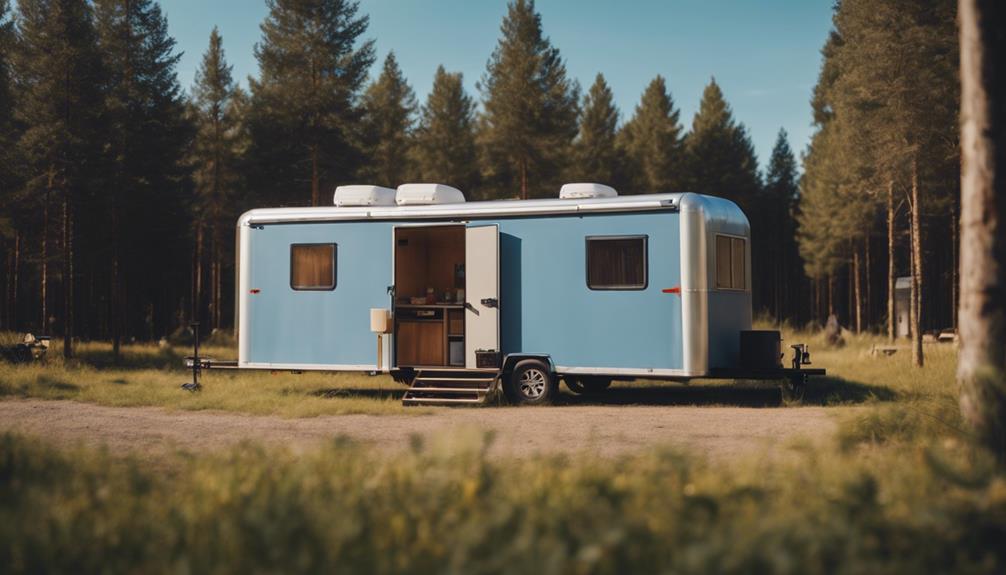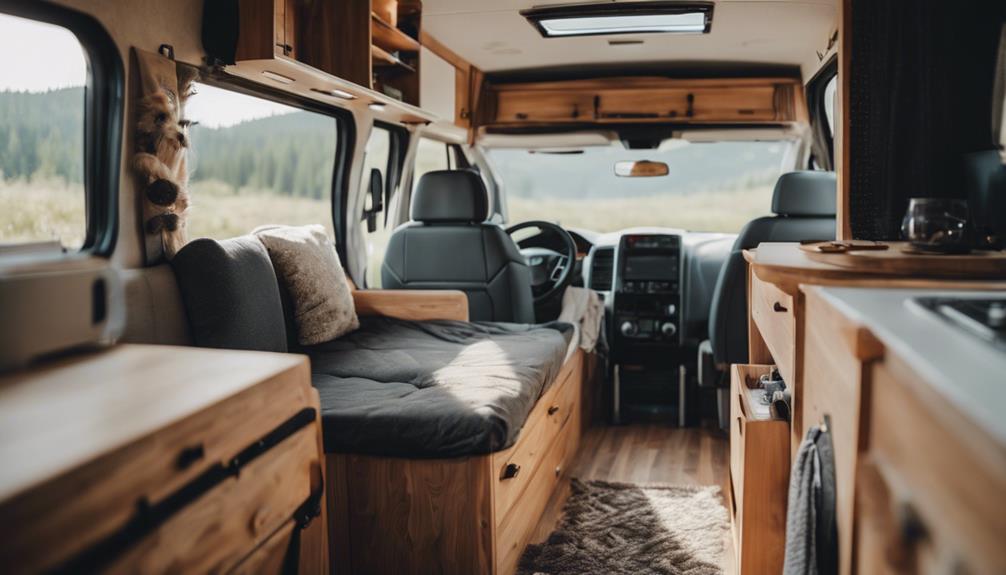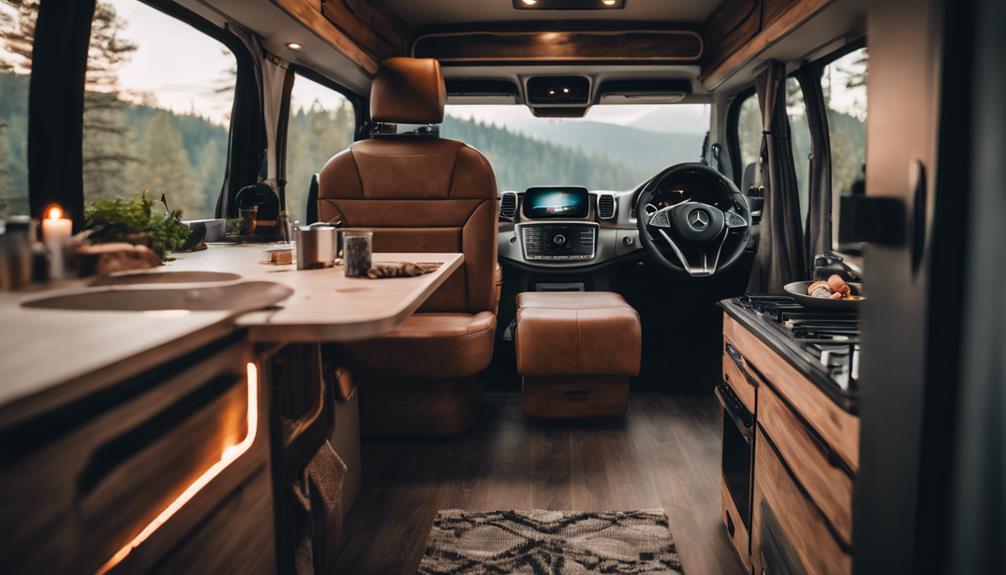When you're choosing a vehicle for camper conversion, consider spacious options like the Mercedes Sprinter and Ford Transit. Both offer ample customization and have strong resale value, making them smart investments. If you're on a budget, the Ram ProMaster provides good maneuverability, while the compact Nissan NV200 works well for solo travelers. For city dwellers, the Ford Transit Connect is a solid choice with excellent fuel economy. Each of these vehicles has unique benefits, allowing you to create your perfect mobile living space. Discover the details that can influence your decision next.
Introduction
When it comes to camper conversions, choosing the right vehicle can make all the difference in your adventures on the road.
The Mercedes Sprinter stands out with its spacious interior and extensive conversion options, making it a top choice for those seeking a comfortable mobile living experience.
If you prioritize versatility and fuel efficiency, the Ford Transit offers various sizes and roof heights, appealing to van lifers who want a tailored fit for their needs.
On the other hand, if you're looking for a budget-friendly option, the Ram ProMaster features a front-wheel drive design that enhances maneuverability, making it an economical choice for camper conversion.
For solo travelers or those with limited space requirements, smaller vans like the Nissan NV200 and Ford Transit Connect can be great alternatives. They provide excellent fuel efficiency, though they do offer limited living space.
Ultimately, your decision should be influenced by factors like budget, mileage, reliability, and intended use.
Thorough research will guide you toward the best vehicle that aligns with your vision for van life, ensuring you hit the road with confidence and excitement.
Background Information
In recent years, you've probably noticed a significant rise in the popularity of camper van conversions.
This surge reflects a growing demand for flexible travel options and unique living spaces.
With more people seeking an adventurous lifestyle, understanding the best vehicles for these conversions is essential.
Van Conversion Popularity Surge
Camper van conversions have gained immense popularity, fueled by remote work trends and a growing desire for flexible travel among various demographics. This van conversion popularity surge is evident as more people seek out mobile living options that fit their lifestyles. Social media platforms have played a significant role in showcasing camper van conversions, inspiring countless enthusiasts to undertake their own projects.
As demand has risen, the market for DIY kits and professional conversion services has expanded, making customization more accessible than ever. Whether you prefer a hands-on approach or want to hire experts, there are options for everyone. Models like the Mercedes Sprinter and Ford Transit have become the go-to choices for many, thanks to their spacious interiors and strong resale values.
Additionally, there's a noticeable shift towards eco-friendly materials and innovative technology in these conversions. Consumers are increasingly focused on sustainability, making choices that reflect their values. This not only enhances the appeal of camper van conversions but also contributes to the overall growth of the mobile living movement, allowing you to create a personalized space that meets your unique needs.
Increased Demand for Camper Vans
The surge in demand for camper vans reflects a growing desire for adventure and flexibility among diverse groups of people. As remote work becomes more common, you might find yourself seeking flexible living arrangements that allow you to travel while working. Families and young professionals are increasingly embracing the van life culture, fueling interest in camper van conversions.
The market now offers a variety of options for those looking to customize their vans. Whether you're considering a Mercedes Sprinter or exploring Ford Transit van conversions, there's a model for everyone. DIY conversion kits are popular for those who enjoy hands-on projects, while professional conversion services cater to those who prefer a ready-to-go solution.
As you navigate this landscape, you'll notice that well-maintained converted vans hold strong resale values, making them a smart investment. Additionally, the trend toward sustainable living drives consumers to seek eco-friendly materials and energy-efficient systems in their conversions.
With so many options available, the demand for camper vans is set to continue growing, making it an exciting time for mobile living enthusiasts like you.
Emerging Van Conversion Trends

As you consider your camper van conversion, you'll notice a strong shift towards eco-friendly materials that not only enhance aesthetics but also reduce environmental impact.
More builders are prioritizing sustainable options, making your choice not just a personal adventure but also a responsible one.
Embracing these trends can transform your van into a stylish and environmentally conscious home on wheels.
Eco-Friendly Conversion Materials
Many van lifers are now embracing eco-friendly conversion materials, which not only enhance the aesthetic appeal of their interiors but also greatly reduce environmental impact.
By opting for bamboo plywood and reclaimed wood, you can create a beautiful and durable space that reflects your commitment to sustainability. For insulation, consider using sheep's wool or recycled denim, as these options provide excellent thermal performance while being kind to the planet.
Integrating solar panels into your conversion allows you to harness renewable energy, while energy-efficient appliances further reduce your reliance on fossil fuels. This combination not only makes your van more sustainable but also lowers your overall energy costs during travels.
Additionally, upcycled materials, like repurposed furniture and textiles, are gaining popularity, helping you craft a unique and personalized interior while minimizing waste.
To finish off your project, choose biodegradable paints and low-VOC finishes, which contribute to healthier air quality within your living space.
Eco-Friendly Materials Utilization
Eco-friendly materials are transforming van conversions, making it easier for you to create a stylish and sustainable living space on the road. By incorporating sustainable options like bamboo cabinetry and recycled plastics for insulation, you can minimize your environmental impact while enhancing the aesthetics of your camper.
Many van lifers now opt for low-VOC paints and finishes, improving indoor air quality and reducing harmful emissions in their homes on wheels. You'll find that solar panels and energy-efficient appliances are common features in modern van conversions, allowing you to travel without relying heavily on fossil fuels.
The use of reclaimed wood for furniture and flooring adds unique rustic charm while supporting sustainable forestry practices and reducing waste. If you're an environmentally conscious consumer, consider exploring DIY van conversion kits that utilize eco-friendly materials.
These kits not only help you personalize your living space but also align with your values of minimizing your carbon footprint. With these advancements, you can enjoy the freedom of the open road while staying committed to sustainability in your van life journey.
Cost-Benefit Comparison
When considering a camper conversion, it's crucial to weigh the advantages and disadvantages of different vehicles.
You'll want to look at manufacturer recommendations and assess the cost versus value of your options.
This evaluation will help you make an informed decision that aligns with your budget and camping needs.
Advantages and Disadvantages Overview
Choosing the right vehicle for camper conversion involves weighing the benefits and drawbacks, as each option presents unique costs and long-term value considerations.
The Mercedes Sprinter stands out for its superior build quality and high resale value, making it a solid choice for serious travelers, despite its higher starting price of around $53,400 and maintenance costs that can reach $5,000 over five years.
On the other hand, the Ford Transit offers a more budget-friendly option at around $52,000, with better fuel economy, which appeals to cost-conscious van lifers. Its maintenance costs are generally lower, ranging from $2,500 to $4,000.
The Ram ProMaster, priced at approximately $50,000, is the most budget-friendly choice. However, it comes with lower fuel efficiency and resale value, potentially impacting your long-term costs.
Ultimately, understanding these advantages and disadvantages is essential when deciding on a vehicle for camper conversion. Balancing factors like initial costs, maintenance, and resale value will help you make the best choice for your mobile living aspirations.
Manufacturer Recommendations
Evaluating manufacturer recommendations helps clarify the cost-benefit balance for each vehicle option in camper conversions.
The Mercedes Sprinter stands out with its robust build quality and spacious interior, but its starting price of around $53,400 and higher maintenance costs of $3,000 to $5,000 over five years make it a premium choice. Its high resale value may offset some initial investment.
On the other hand, the Ford Transit, starting at approximately $52,000, offers good fuel economy and various customization options. With lower maintenance costs of $2,500 to $4,000 over five years, it remains a popular choice for many van lifers looking for versatility in the conversion process.
If you're looking for a budget-friendly option, the Ram ProMaster comes in at around $50,000. While it provides a spacious interior and excellent maneuverability, it generally has lower resale value and less fuel efficiency than its competitors. This option is ideal if you want to keep initial costs down while still enjoying the camper conversion experience.
Each vehicle has its merits, so weigh these factors against your goals and budget.
Cost Vs. Value Assessment
Balancing cost and value is essential in determining the best camper conversion vehicle for your needs and budget. When conducting a cost vs. value assessment, consider models like the Mercedes Sprinter and Ford Transit, which may come with higher initial prices but offer strong resale value and lower depreciation compared to the Ram ProMaster.
The average total conversion cost hovers around €17,500, but basic DIY conversions can start as low as €6,236, saving you between €5,000 to €10,000 if you're handy. However, remember that DIY projects require time and skills, unlike professional conversions that can exceed €100,000 for high-end builds.
Maintenance costs also play an important role in your ongoing expenses. Over five years, the Sprinter's maintenance can reach $3,000 to $5,000, while the Transit and ProMaster average $2,500 to $4,000. Therefore, evaluating these ongoing costs is essential for your overall budget.
Ultimately, choosing the right camper van conversion vehicle means weighing immediate costs against long-term value, ensuring you make a smart investment for your mobile living experience.
Essential Tools for Conversion

When you start your camper conversion, having the right tools makes all the difference.
You'll need to focus on safety standards while ensuring your process runs smoothly, so gear up with essentials like a circular saw, drill, and measuring tape.
Let's break down what you really need to get the job done right.
Conversion Process Overview
To successfully convert a vehicle into a camper, you'll need essential tools like a power drill, saws, wrenches, and screwdrivers for building and assembly. This conversion process overview covers the basics you'll require for your camper van conversion. Accurate measurements are critical, so keep a level and measuring tape handy to guarantee furniture and fixtures fit perfectly in your generous interior space.
Safety gear, including gloves, goggles, and a mask, is important during the conversion. Protect yourself from dust and debris while working on popular van models. A heat gun can help you bend or shape materials like plastic or vinyl for those custom installations.
When it comes to the electrical system, having an electrical multimeter on hand is necessary for testing wiring connections and making sure your lights and appliances operate safely. Whether you're a seasoned DIY enthusiast or a first-timer, these tools will streamline your process, making it easier to build or install the features you envision.
With the right tools, you'll be well-equipped to transform your vehicle into a cozy camper that meets your needs.
Safety Standards for Conversions
Understanding safety standards for camper van conversions is fundamental to guarantee your vehicle meets all necessary regulations and provides a secure living environment.
You'll need to confirm compliance with local regulations concerning gas, electrical, and plumbing systems to operate safely on the road. Many areas require safety inspections that check for fire hazards and structural integrity, as well as adherence to emissions regulations.
When selecting insulation materials, opt for fire-resistant options that comply with local building codes. This choice will enhance both safety and energy efficiency in your living space.
Installing essential safety features like smoke detectors and carbon monoxide detectors is important. These devices protect you in emergencies and can save lives.
It's wise to consult with local authorities or experienced professionals to make certain all modifications align with safety standards applicable to camper van conversions.
By prioritizing these safety measures, you'll create a secure and comfortable environment for your adventures on the road.
How Can I Convert My SUV Into a Camper Using the Best Conversion Kit?
Transform your SUV into a comfortable camper with the best suv camper conversion kit on the market. This easy-to-install kit includes everything you need to create a cozy sleeping area, storage space, and even a kitchenette. Experience the freedom of road-tripping with your own converted camper SUV.
Conclusion
Ultimately, choosing the right vehicle for your camper conversion hinges on your budget, lifestyle, and travel aspirations.
The Mercedes Sprinter and Ford Transit stand out with their spacious interiors and extensive customization options, providing excellent platforms for personalizing your mobile living space.
If you're looking for a more budget-friendly option, the Ram ProMaster offers great maneuverability and a unique layout, making it perfect for taller configurations.
When planning your conversion, keep in mind that costs can vary widely—from basic builds around $7,500 to luxurious options exceeding $100,000.
It's essential to take into account your travel needs, including fuel efficiency, maintenance costs, and interior space, to verify the vehicle fits your lifestyle.
Additionally, popular models like the Sprinter and Transit retain their resale value well, making them smart investments.
In the end, the best choice will align with your specific requirements and preferences, allowing you to create a comfortable and functional camper.
Take your time to weigh each option, and soon you'll be ready to hit the road in your dream vehicle.
Frequently Asked Questions
What Is the Best Car to Convert Into a Camper?
To convert a car into a camper, you'll want something spacious and adaptable. Consider options like the Mercedes Sprinter or Ford Transit for their interior space and versatility, ensuring it fits your camping needs perfectly.
What Is the Best Car for Vanlife?
When you're diving into vanlife, consider spacious options like the Mercedes Sprinter or Ford Transit for comfort. If you're on a budget, the Ram ProMaster's affordability and maneuverability make it a great choice too.
What Is the Most Reliable Van for Conversion?
When you're searching for the most reliable van for conversion, consider the Mercedes Sprinter and Ford Transit. Both offer durability, dependability, and excellent resale value, making them solid choices for your conversion project.
What Is the Best Budget Van to Convert to Camper?
If you're looking for a budget-friendly van to convert, consider the Ford Transit Connect or Ram ProMaster City. Both offer excellent fuel efficiency and reasonable prices, making them great choices for your conversion project.
Conclusion
To sum up, choosing the right vehicle for your camper conversion can transform your mobile living experience.
Whether you prefer a van, truck, or bus, each option comes with unique benefits that can enhance your adventures.
By staying informed about emerging trends and understanding the costs involved, you'll make a more confident decision.
So, grab your tools, start planning, and get ready to hit the road in style and comfort.
Your dream home on wheels awaits!










